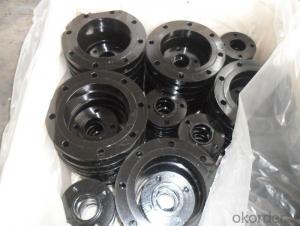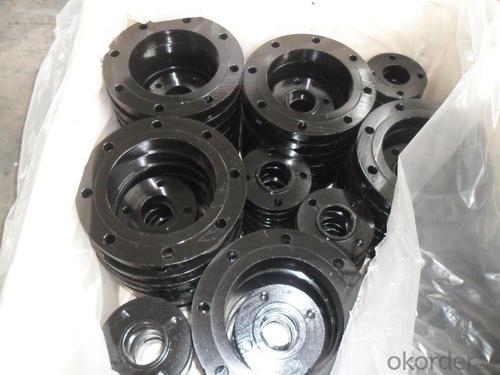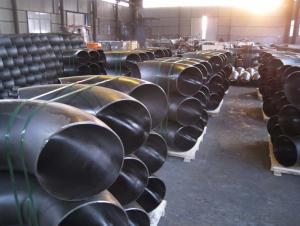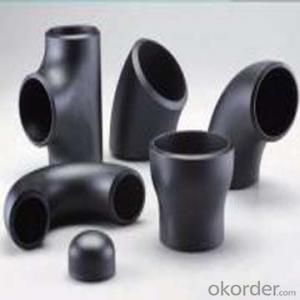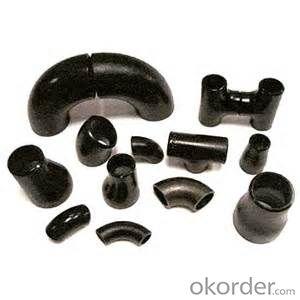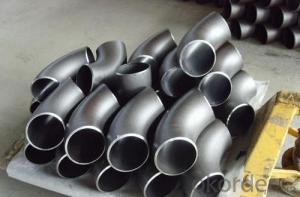CARBON STEEL PIPE FITTINGS ASTM A234 BEND 1''
- Loading Port:
- Tianjin
- Payment Terms:
- TT OR LC
- Min Order Qty:
- 1 m.t.
- Supply Capability:
- 30000 m.t./month
OKorder Service Pledge
OKorder Financial Service
You Might Also Like
Specifications
1.we produce seamless steel pipe
2.size:48-219*4.5-45mm
3.ISO 9000 approved
4.Market:south/east Asia,Mid-east,South America
seamless steel pipe
Material J55 K55 N80 L80 P110.etc
Standard ASTM JIS
Usage conveying oil gas ,oil pipe line,pipe material collar,oil nature gas,
Packing wooden cases or wooden pallet ,export standard package
Others:Special design available according to requirement
Anti-corrosion available and high temperature resistence
Delivery time 30days
Payment term T/T L/C
Name | API oil casing pipe | ||||
Out Diameter | Wall thickness | Material | Thread | Length | |
in | mm | ||||
5 1/2 | 139.7mm | 6.20 | J55/K55/N80 | LTC/STC/BTC | R2 |
6.98 | |||||
7.72 | |||||
9.17 | |||||
10.54 | |||||
6 5/8 | 168.28mm | 7.32 | J55/K55/N80 | LTC/STC/BTC | R2 |
8.94 | |||||
10.59 | |||||
12.06 | |||||
12.06 | |||||
8 5/8 | 219.08 | 8.94 | H40 | S/L/B | 9 5/8R2 |
J55/K55 | S/L/B | ||||
10.6 | L80 | L/B | |||
12.7 | L80 C95 | L/B | |||
14.15 | P110 | L/B | |||
9 5/8 | 244.48 | 13.84 | J55 K55 | R2 | |
15.11 | L80 | L/B | |||
10 3/4 | 273.05 | 11.43 | J55 K55 | S/B/E | R2 |
13.84 | P110 | S/B | |||
15.11 | P110 | S/B | |||
11 3/4 | 298.45 | 12.19 | J55 K55 | S/B | R2 |
10.96 | J55 K55 | S/B | |||
13 3/8 | 339.72 | 12.19 | J55 K55 L80 | S/B | R2 |
10.92 | J55 K55 | S/B | |||
13.06 | L80 | S/B | |||
Coupling and thread can be required according to customer requirment
- Q: What are the different coating materials used for steel pipes?
- There are several different coating materials used for steel pipes, including epoxy, polyurethane, coal tar enamel, and zinc. These coatings are applied to the steel pipes to provide protection against corrosion and to enhance their durability and lifespan.
- Q: How are steel pipes tested for strength and durability?
- Steel pipes are typically tested for strength and durability through various methods, including non-destructive testing techniques such as ultrasonic testing, magnetic particle inspection, and visual inspection. These tests help identify any potential defects, cracks, or flaws in the pipes. Additionally, destructive tests like tensile testing and impact testing are conducted to measure the strength and toughness of the steel pipes. These rigorous testing procedures ensure that the pipes meet the required standards and can withstand the intended applications.
- Q: What are the different types of steel pipe joints for underwater applications?
- There are various types of steel pipe joints used for underwater applications, including welded joints, flanged joints, and mechanical joints. Welded joints involve fusing the ends of the pipes together using welding techniques, creating a continuous, strong connection. Flanged joints use flanges, which are flat, circular discs, to connect and secure the pipes together. These joints are commonly used in applications that require frequent disassembly. Mechanical joints, on the other hand, utilize mechanical devices such as couplings or clamps to connect the pipes. These joints provide flexibility and ease of installation and removal.
- Q: What is the size of seamless steel tube DN150?
- Seamless steel pipe having a hollow cross section, used as a conduit for conveying fluids, such as pipelines for transporting petroleum, natural gas, gas, water, and certain solid materials. Compared withsteel and roundsteelinsolid, flexural torsional strength in the same time, the weight is light, is a kind of economic section steel, widely used in the manufacture of structural parts and mechanical parts, such as the oil pipe, automobile transmission shaft, the bicycle frame and steel construction with scaffold with steel pipe manufacturing ring parts can be improved the utilization rate of materials, simplify the manufacturing process, material saving and working hours, has been widely used to manufacture steel tube.
- Q: Can steel pipes be used for mining applications?
- Yes, steel pipes can be used for mining applications. Steel pipes are known for their strength, durability, and resistance to extreme conditions, making them suitable for various mining activities such as transporting water, air, or chemicals, as well as for structural support and ventilation systems in mines.
- Q: How are steel pipes used in the construction of stadiums?
- Steel pipes are used in the construction of stadiums for various purposes such as supporting the roof structure, creating the framework for seating areas, and providing a sturdy infrastructure for plumbing and ventilation systems.
- Q: How do you calculate the pipe pressure drop coefficient for steel pipes?
- To calculate the pipe pressure drop coefficient for steel pipes, you can use the Darcy-Weisbach equation. This equation relates the pressure drop in a pipe to various factors such as the flow rate, pipe diameter, pipe length, and the properties of the fluid being transported. The pressure drop coefficient, also known as the friction factor or the Darcy-Weisbach friction factor, is denoted by the symbol f. It is a dimensionless parameter that represents the resistance to flow in the pipe. The value of f depends on the flow regime, which can be laminar or turbulent. For laminar flow, which occurs at low flow rates or with viscous fluids, the pressure drop coefficient can be calculated using the Hagen-Poiseuille equation. This equation relates the pressure drop to the fluid viscosity, pipe length, pipe diameter, and flow rate. However, for turbulent flow, which occurs at higher flow rates, the calculation of the pressure drop coefficient is more complex. It depends on the roughness of the pipe wall, which affects the flow resistance. The roughness is typically quantified using the relative roughness, which is the ratio of the pipe wall roughness to the pipe diameter. To calculate the pressure drop coefficient for turbulent flow in steel pipes, you can use empirical correlations or Moody's diagram. Moody's diagram provides a graphical representation of the friction factor as a function of the Reynolds number and the relative roughness. The Reynolds number represents the flow regime and is calculated using the fluid properties, flow rate, and pipe dimensions. By finding the intersection of the Reynolds number and relative roughness on Moody's diagram, you can determine the corresponding pressure drop coefficient. It's important to note that the pressure drop coefficient for steel pipes may vary depending on the specific pipe dimensions, surface roughness, and fluid properties. Therefore, it is recommended to consult relevant standards or engineering references for accurate and up-to-date values of the pressure drop coefficient for steel pipes in your specific application.
- Q: What are the advantages of using steel pipes in plumbing systems?
- There are several advantages to using steel pipes in plumbing systems. Firstly, steel pipes are highly durable and resistant to corrosion, making them ideal for carrying water and other fluids. They can withstand high pressure and extreme temperatures, ensuring long-term reliability. Additionally, steel pipes have a smooth interior surface, resulting in less friction and improved flow efficiency. They are also fire resistant, reducing the risk of accidents. Moreover, steel pipes are eco-friendly as they can be recycled, promoting sustainability. Overall, steel pipes offer strength, longevity, and reliability, making them a preferred choice in plumbing systems.
- Q: Can steel pipes be used for underground power transmission?
- Indeed, underground power transmission can make use of steel pipes. Due to their resilience, robustness, and resistance to corrosion, steel pipes are extensively employed in underground power transmission systems. These pipes serve as a safeguarding enclosure for power cables, guaranteeing their security and shielding them from potential harm caused by external elements like moisture, soil movements, and potential impacts. Moreover, the use of steel pipes facilitates easy installation, maintenance, and repair of the power transmission system. Additionally, their ability to withstand high pressure and temperature renders them suitable for conveying the high voltage electricity essential for power transmission. All in all, steel pipes are a dependable and effective choice for underground power transmission.
- Q: How are steel pipes used in the renewable energy industry?
- Steel pipes are used in the renewable energy industry for various purposes such as transporting fluids, gases, and steam in thermal power plants, geothermal installations, and solar thermal systems. They are also utilized in the construction of wind turbine towers and the transmission of electricity from renewable energy sources.
Send your message to us
CARBON STEEL PIPE FITTINGS ASTM A234 BEND 1''
- Loading Port:
- Tianjin
- Payment Terms:
- TT OR LC
- Min Order Qty:
- 1 m.t.
- Supply Capability:
- 30000 m.t./month
OKorder Service Pledge
OKorder Financial Service
Similar products
Hot products
Hot Searches
Related keywords
